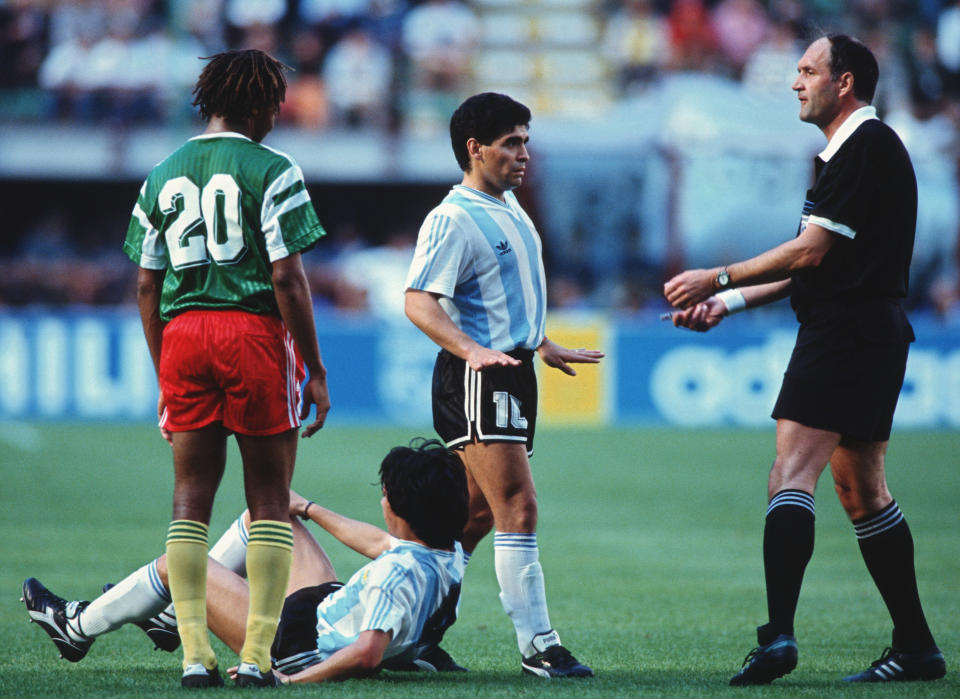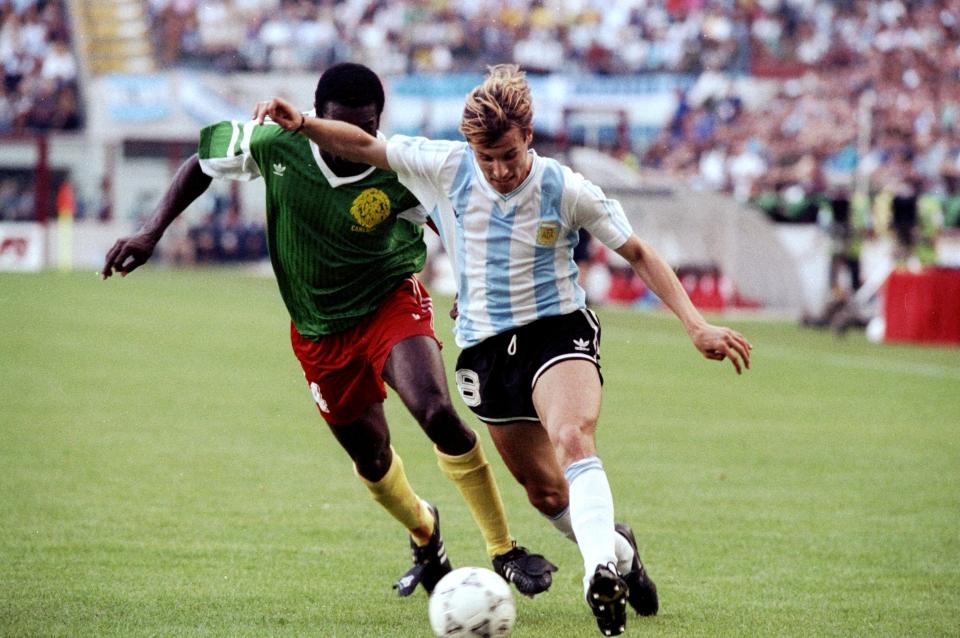World Cup shocks: The Miracle of Milan as Cameroon stunned Argentina at Italia 90

Change is not always for the better. When World Cups begin these days, they do so with the hosts contesting the first game. It was not always the case. The holders used to begin the tournament. Twenty-eight years ago, that created “the most seismic opening result of any World Cup,” as Simon Hart called it in World In Motion, his account of the 1990 World Cup.
Its significance was apparent at the time. “Some will call it ‘The Miracle of Milan.’ Others might call it the ‘Mugging of Maradona,’” wrote William Gildea in the Washington Post in 1990. Diego Maradona was the world’s best footballer, Argentina the World Cup holders. Cameroon were 500/1 outsiders to lift the trophy. But while they did not do that, it is no exaggeration to say they changed the World Cup with a victory that had both an immediate impact and a legacy.
It was a shock; for almost everyone, anyway. “I don’t understand this talk of a surprise. People underestimated us,” said Roger Milla, Cameroon’s greatest player. Those people included Argentina. They “took us for rabbits,” Milla told Hart.
The sentiments, if not the words, may not have been understandable. Milla pointed out that Cameroon had drawn with the eventual winners, Italy, and semi-finalists, Poland, in the 1982 World Cup, and had some of the same players. Yet they had not qualified in 1986, had been abject in the 1990 African Cup of Nations and seemed to arrive in Italy in a shambolic state. “Unless something drastic happens, we will make an embarrassment of ourselves in Italy,” goalkeeper Thomas N’Kono warned. Embarrassment seemed to beckon. Cameroon lost warm-up games to undistinguished club sides. They had no kit for their training camp in Yugoslavia.
PLAY: England’s World Cup record since 1966
VOTE: Who is your all-time World Cup legend?

Their little-known Russian manager, Valery Nepomnyashchy, had never coached a first-division club anywhere. He did not speak French so the chauffeur at the Soviet embassy doubled up as a translator. Eleven of Cameroon’s squad were based at home; one reckoned he was earning about £75 a month. Only one of their 22 players plied his trade for a top-flight European club. The 38-year-old Milla, who had been living in semi-retirement on the island of Reunion, was recalled on the orders of the country’s president, Paul Bika. And an entire continent was largely overlooked: no sub-Saharan African country had ever won a game at a World Cup. Cameroon, pitted with the 1986 World Cup winners, the 1988 European Championship runners up, in Soviet Union, and Romania, four years after Steaua Bucharest won the European Cup, seemed unlikely to change that.
Meanwhile, Maradona had just helped Napoli regain the Serie A title. He was near the peak of his powers, albeit a man increasingly caught up in paranoia and feuds. “He played like an obsessive, with little joy,” wrote Jimmy Burns in Hand Of God, his biography of the Argentinian.
Certainly there was little joyous about his meeting with Cameroon at the San Siro. “It was meant to be the Fair Play World Cup, but it started off with them kicking the living daylights out us,” Maradona said in El Diego, his autobiography.
He was expecting it, wearing shin pads on both his calves and his shins. He did not have a shot on target, but he was fouled 12 times. Some of the tackling was brutal. And yet when the red card came out, it was in rather innocuous fashion, with Andre Kana-Biyik becoming the first man dismissed in the opening game of any World Cup for a foul on Claudio Caniggia. Cameroon’s task, already difficult, seemed impossible.
Instead, a mixed few minutes for one family was capped when Cyrille Makanaky hooked the ball high into the air and Francois Omam-Biyik, Andre’s brother, won a header that squirmed under Nery Pumpido and in. It was a goalkeeping error. N’Kono made none. He was a surprise selection. His wife, thinking he would not play, had gone shopping instead of watching her husband.

She missed an iconic moment. Already down to 10 men, Cameroon were then reduced to nine. The lively Caniggia had skipped away from two would-be tacklers, evading increasingly desperate attempts to bring him down. Benjamin Massing had been marking Maradona but saw the substitute running free. He came charging across, flying in for what Hart called: “Full-frontal stuff, cartoonish in its crudeness. There is arguably no more famous foul in finals history.”
“I came in on him like a truck,” Massing told Hart before his death in 2017. Ludicrously, he was only shown a second yellow card, but it still amounted to a red. The subsequent notoriety, the defender said, was “A nice thing for me. It’s affection I get more than anything else.” And indeed Cameroon, despite or because of some of their physical challenges, inspired affection.
Having beaten Argentina, the Indomitable Lions lived up to their nickname. They defeated Romania and then Colombia, thanks to braces from the substitute Milla, the World Cup’s oldest scorer, before eventually being halted by England in a quarter-final where they had led.
PLAY: World Cup famous goal scorers quiz
PLAY: World Cup classic kits
Meanwhile, Argentina manager Carlos Bilardo called defeat to Cameroon “the worst moment of my sporting career.” As Argentina flew back to Rome, Maradona interrupted Bilardo to tell his team-mates: “Either we reach the final or may the plane carrying us back to Argentina fall out of the sky.”
The plane landed safely. Argentina limped through the group in third place and won two penalty shootouts on an unconvincing progress to the final, realising Maradona’s prediction. But a tournament that began with two of their opponents dismissed ended with two Argentinians red-carded in a loss to Germany. It was Argentina’s second hugely popular 1-0 defeat of the World Cup.
.

 Yahoo Sport
Yahoo Sport 






































